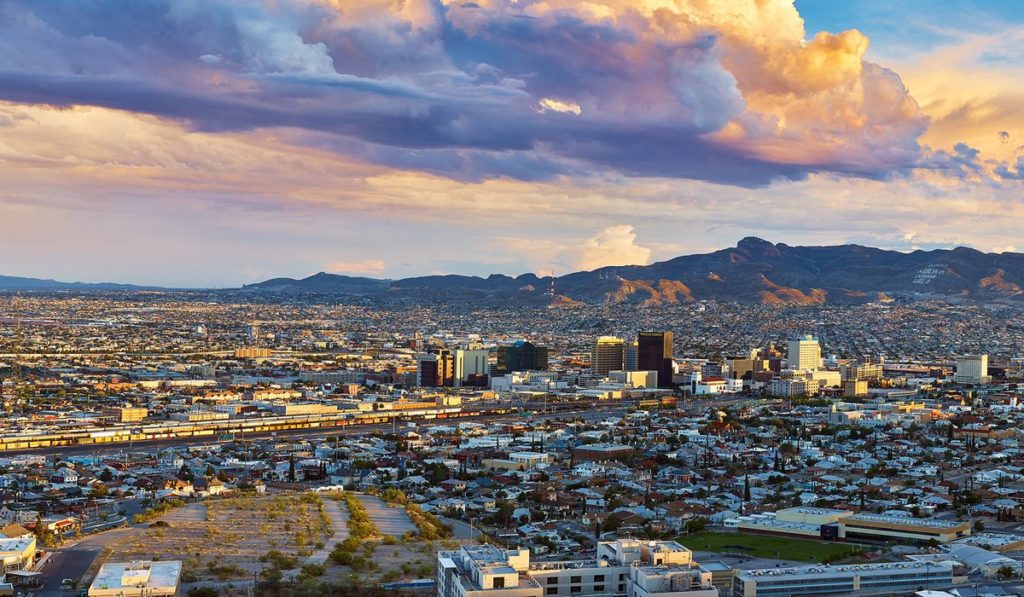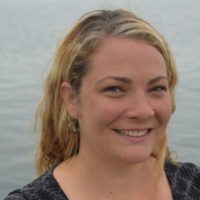By Sara Levine, Quality Schools Program Officer, The Rogers Family Foundation
Going PLACES is an occasional blog series featuring the voices and experiences of TFN’s PLACES Fellows. For more information on the fellowship, and to read past blog posts from our fellows, visit here.

El Paso appears like a man-made island surrounded by the vast emptiness of the west Texas desert, far from everywhere except Ciudad Juarez. From the air the cities appear as one between two dusty purple mountain ranges, the Rio Grande snaking through the middle. Through town, the border wall follows and departs from the river bed as the water runs intermittently through man-made channels and the unaltered land.
You might have heard that this border is the third-most militarized in the world. You also might have heard of the asylum-seekers — including children — who have died in US custody in the prison-like detention centers (in El Paso and elsewhere) that continue to hold thousands of separated migrant families.
I have heard these things about this border, and more, and have felt close to tears in the days leading up to our El Paso PLACES site visit.
The morning of our first day in El Paso our PLACES facilitator Bina M. Patel of Saathi Impact asks, “What do you carry with you?”
In my journal I write: Heavy heart. Sadness. Anger. Love. Eagerness to help. Appreciation for the PLACES cohort. Emotion running close to the surface.
In pairs we practice building new stories of a personal or professional moment that challenged us. How does it become a story of triumph without diminishing the experience? How can we as listeners, as witnesses, show up as healers?
Healing. El Paso continues to heal from loved ones lost to white supremacy and gun violence on Aug. 3d, 2019.
The border is, and has been, a gaping wound and a scar.
In conversations over the three days we are together, we keep returning to this question: How do we counteract systemic hopelessness? How do we
— how do communities — remain resilient? How can philanthropy support the work of movement building in the face of relentless sadness?
As witnesses and aspiring healers, we can’t take the bait of hopelessness. The status quo is exactly what they — the xenophobes, the white supremacists, the neoconservatives — want. Action is the antidote.
I am thankful to be in this place with my PLACES people.
We hear over and over again: El Paso’s history is textured by ancient land routes, by the constant movement of people, both forced and chosen. It is a city that rejects the “otherness” of a polarizing national narrative again and again. As Eric Summerford Person, president and CEO of the El Paso Community Foundation, says, “It’s who we were and who we are.” Learning about the foundation’s efforts to do agile, culturally responsive, community-driven grant-making is heartening.
El Paso has a deep-seated activist community. Inside the Chihuahuita Community Center, I am humbled by the work of Fernando Garcia, founding director of the Border Network for Human Rights (BNHR). With over 7,000 members, BNHR “supports immigrant border communities in the promotion of their human rights and the demand of human immigration reform that is consistent with human rights”. The criminalization of immigrants, the business of the border, is a moment 30 years in the making, with the last two years marked by increasingly outspoken white supremacists and emboldened armed militias. “We are building a movement,” Fernando says. “Sometimes we don’t see it, but it’s there.”
Small incremental change is systems change, Bina said in our first meeting. We don’t see it, but it’s there.
We meet with Krysten Aguilar and Marlene Yanez from La Semilla Food Center, based in Anthony, New Mexico. Krysten explains that in addition to the food education, food access, and economic development programs they run, La Semilla Food Center sees food as a tool to dismantle systemic racism, through participatory leadership, paying community members for their time, and explicit anti-racism training.
It’s not all hopeless, but the work is relentless.
We visit a shelter run by Annunciation House, a safe place for a night or two for asylum seekers who have been released, with nothing, from detention. Young families, older women and men. We awkwardly “tour” the center and then wait in the front vestibule of the building as the Assumption House staff finishes their business.
“Ustedes son migrantes?” one elderly woman asks when she sees us. Are we migrants? No no, we’re just visiting I say. She waves her hand and says, “No matter. All are welcome.”
A few minutes later a black-haired little boy no more than 4 years old runs into the bathroom and emerges far too quickly.
“¿Te lavaste las manos?”
Did you wash your hands? I ask in Spanish. He looks at his hands and smiles at me with the look of little boys everywhere who have not washed their hands. With a big smile he scampers away.
We are pulled into heartbreak but that’s not the end. It can’t be.
On our last evening together, we sing and meditate together while playing drums under the open sky. We need space to heal, too. I am thankful for this group of smart, thoughtful, deeply passionate and compassionate people. I am thankful for the joy I feel when we’re together and it is this joy, coupled with renewed commitment to action that I take home with me to Oakland.
About the Author

Sara Levine has worked in the non-profit sector for more than 15 years before joining The Rogers Family Foundation in July 2016. In her role, she leads the foundation’s strategic initiative to create the conditions for quality public schools for all children in Oakland, Calif. She previously worked with New York City Leadership Academy (NYCLA) where she consulted nationally and internationally with superintendents and central office leaders to transform their local education systems. Prior to working with NYCLA, Sara was program director at Worldfund (now Educando), where she designed and launched the LISTO program, a leadership development program for public school principals in Mexico. Sara also spent three years as the director of Raising a Reader Alameda County, an early childhood literacy program, several years working in community development projects in rural Oaxaca, Mexico, and time as a teacher in Los Angeles, Calif., and Madrid, Spain. Sara holds a Bachelor of Arts from Yale University and also earned her Master of Arts in International Affairs with a concentration in Development and Latin America from George Washington University. Sara is proud to be a 2019 PLACES Fellow with the Funders’ Network. Sara lives in Oakland.
